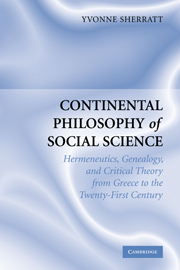Book contents
- Frontmatter
- Contents
- Preface
- Continental Philosophy of Social Science
- Introduction
- PART I THE TRADITION OF HERMENEUTICS
- PART II THE TRADITION OF GENEALOGY
- PART III CRITICAL THEORY
- Introduction
- 9 The History of Critical Theory
- 10 Critical Theory of the Early Frankfurt School
- 11 Innovations in Critical Theory: Adorno and Habermas
- Conclusion
- Bibliography
- Index
10 - Critical Theory of the Early Frankfurt School
Published online by Cambridge University Press: 23 November 2009
- Frontmatter
- Contents
- Preface
- Continental Philosophy of Social Science
- Introduction
- PART I THE TRADITION OF HERMENEUTICS
- PART II THE TRADITION OF GENEALOGY
- PART III CRITICAL THEORY
- Introduction
- 9 The History of Critical Theory
- 10 Critical Theory of the Early Frankfurt School
- 11 Innovations in Critical Theory: Adorno and Habermas
- Conclusion
- Bibliography
- Index
Summary
Horkheimer built his notion of critical theory upon an idea of theory that differed from the ordinary use of the term. He argued that ‘theory’ was not about developing a string of connected statements that represented the nature of the world around us. He did not believe that the word ‘theory’ should simply refer to a static set of propositions. In contrast, he thought that theory referred to a kind of activity generated within a particular social context. For him theory means in essence what you and I would normally take theorising to mean.
Human societies are constantly acting upon nature in order to maintain their existence and in order to reproduce themselves. We burn fuel, build houses, plough land, all to perpetuate our human lives. In the course of doing these things, we need to understand the nature of our world so we gain knowledge in order to enable us to produce and reproduce more efficiently. The kinds of knowledge that we develop whilst undergoing these activities of human social and economic survival are processed together as kinds of theories. For example, theories about diseases, about animal migration, geological strata or indeed Newtonian science. All these theories that are part of the activity of human survival are called ‘traditional’ theories, according to Horkheimer.
Horkheimer believed that there was a very different kind of theorising to the traditional variant. This different type of theorising had quite distinct goals from the former.
- Type
- Chapter
- Information
- Continental Philosophy of Social Science , pp. 198 - 209Publisher: Cambridge University PressPrint publication year: 2005



